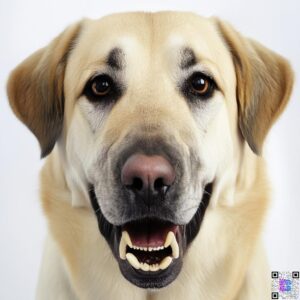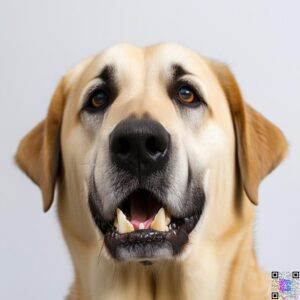Introduction
Anatolian Shepherds are known for their loyalty, intelligence, and protective nature. However, like all dogs, they are susceptible to dental problems that can affect their overall health and well-being. Proper dental care is essential for keeping your Anatolian Shepherd’s teeth and gums healthy throughout their life. In this article, we’ll explore the anatomy of Anatolian Shepherd teeth, the importance of dental care for puppies and adults, common dental issues in the breed, and how to prevent and treat dental problems. By the end, you’ll have a better understanding of how to keep your Anatolian Shepherd’s teeth in top condition.
Anatomy of Anatolian Shepherd Teeth

Anatolian Shepherds have a dental formula of 42 teeth, which includes 12 incisors, 4 canines, 16 premolars, and 10 molars. Their teeth are designed for a variety of functions, from tearing meat to grinding plant matter. The incisors are the small, sharp teeth at the front of the mouth, used for nipping and biting. Canines are the large, pointed teeth used for grasping and tearing food. Premolars are used for shredding, while molars are used for grinding.
Dental Development in Anatolian Shepherd Puppies
Anatolian Shepherd puppies are born without teeth, but they begin to develop their deciduous (baby) teeth at around 3-4 weeks of age. By 6-8 weeks, they will have a full set of 28 deciduous teeth. At around 4-6 months of age, the deciduous teeth begin to fall out, and the permanent teeth start to erupt. By the time an Anatolian Shepherd reaches 6-7 months of age, they will have a full set of 42 permanent teeth. During the teething process, it’s important to provide your puppy with plenty of chew toys to help relieve discomfort and prevent them from chewing on furniture or other inappropriate items.
Dental Care for Anatolian Shepherd Puppies
Dental care for Anatolian Shepherd puppies should begin as soon as they start developing their deciduous teeth. Regular brushing with a soft-bristled toothbrush and pet-safe toothpaste can help prevent plaque buildup and keep their teeth and gums healthy. It’s also important to provide your puppy with plenty of chew toys to help keep their teeth clean and strong. Look for toys that are specifically designed for puppies, as they may have softer material that won’t damage their developing teeth. Regular veterinary check-ups are essential for monitoring your puppy’s dental health and catching any potential problems early on.
Dental Care for Adult Anatolian Shepherds
As your Anatolian Shepherd grows into an adult, it’s important to continue providing them with proper dental care. Regular brushing with a soft-bristled toothbrush and pet-safe toothpaste is still essential, but you may need to introduce dental treats and chews to help keep their teeth clean between brushings. Professional dental cleanings are also important for adult Anatolian Shepherds. During these cleanings, your veterinarian will use specialized tools to remove plaque and tartar buildup from your dog’s teeth and gums. They may also recommend dental sealants or fluoride treatments to help protect your dog’s teeth from future buildup.
Common Dental Issues in Anatolian Shepherds
Despite regular dental care, Anatolian Shepherds can still develop dental problems. Some of the most common issues include:
- Periodontal disease: A buildup of plaque and tartar can lead to inflammation of the gums and infection of the teeth and underlying bone.
- Tooth fractures: Anatolian Shepherds are known for their powerful jaws, which can lead to tooth fractures if they chew on hard objects.
- Malocclusions: Improper alignment of the teeth can cause pain and difficulty eating.
- Retained deciduous teeth: Sometimes, deciduous teeth fail to fall out, leading to crowding and increased risk of dental problems.
Diagnosing and Treating Dental Problems
If your Anatolian Shepherd is showing signs of dental problems, such as bad breath, swollen or bleeding gums, or difficulty eating, it’s important to take them to the veterinarian for a dental exam. During the exam, your veterinarian will use specialized tools to examine your dog’s teeth and gums and may recommend dental x-rays to get a better look at any underlying issues. Treatment for dental problems can vary depending on the severity of the issue. In some cases, a professional dental cleaning may be sufficient to remove plaque and tartar buildup. In more severe cases, tooth extractions may be necessary to remove damaged or infected teeth. Your veterinarian may also prescribe antibiotics or pain medication to help manage any infection or discomfort.
Preventing Dental Problems in Anatolian Shepherds
The best way to prevent dental problems in Anatolian Shepherds is to start a regular dental care routine early on and stick with it throughout your dog’s life. This includes:
- Regular brushing with a soft-bristled toothbrush and pet-safe toothpaste
- Providing dental treats and chews to help keep teeth clean between brushings
- Scheduling regular veterinary check-ups and professional cleanings
- Feeding a high-quality diet that supports dental health
By following these steps, you can help keep your Anatolian Shepherd’s teeth and gums healthy and prevent costly dental problems down the road.
Dental Care for Senior Anatolian Shepherds
As Anatolian Shepherds age, they become more susceptible to dental problems. It’s important to continue providing them with regular dental care, including brushing, dental treats and chews, and professional cleanings. Senior Anatolian Shepherds may also require a softer diet to accommodate any tooth loss or dental sensitivity. Your veterinarian can recommend appropriate food options and may suggest dental extractions if necessary to remove any damaged or infected teeth.
Common Misconceptions about Skinny Anatolian Shepherds
There are several misconceptions surrounding the Skinny Anatolian Shepherd, particularly regarding their temperament and care needs. Some people mistakenly believe that these dogs do not require much exercise due to their size; however, they need regular physical activity just like any other breed.Another common myth is that they are not suitable as family pets due to their protective nature. With proper training and socialization, they can be wonderful companions for families while still serving as vigilant guardians.

FAQs
1- What are some signs that my Anatolian Shepherd may have dental problems?
Some common signs of dental problems in Anatolian Shepherds include bad breath, swollen or bleeding gums, difficulty eating, and excessive drooling.
2- How often should I brush my Anatolian Shepherd’s teeth?
It’s recommended to brush your Anatolian Shepherd’s teeth at least 2-3 times per week, if not daily. Use a soft-bristled toothbrush and pet-safe toothpaste.
3- What types of dental treats and chews are best for Anatolian Shepherds?
Look for dental treats and chews that are specifically designed to help remove plaque and tartar buildup. Avoid hard treats that could potentially fracture your dog’s teeth.
4- How often should my Anatolian Shepherd have a professional dental cleaning?
The frequency of professional dental cleanings can vary depending on your dog’s individual needs, but most veterinarians recommend at least one cleaning per year.
5- Can dental problems in Anatolian Shepherds be prevented?
Yes, many dental problems can be prevented through regular brushing, dental treats and chews, and professional cleanings. It’s also important to feed a high-quality diet that supports dental health.
6- What should I do if my Anatolian Shepherd has a broken tooth?
If your Anatolian Shepherd breaks a tooth, it’s important to take them to the veterinarian right away. Broken teeth can be painful and may lead to infection if left untreated.
Conclusion
Proper dental care is essential for keeping your Anatolian Shepherd healthy and happy throughout their life. By starting a regular dental care routine early on and sticking with it, you can help prevent costly dental problems and keep your dog’s teeth and gums in top condition. Remember, regular brushing, dental treats and chews, and professional cleanings are all important components of a comprehensive dental care plan for Anatolian Shepherds. If you have any concerns about your dog’s dental health, don’t hesitate to consult with your veterinarian for advice and guidance.
In conclusion, understanding the needs of the Skinny Anatolian Shepherd is essential for providing them with a happy and healthy life. From maintaining proper nutrition to ensuring regular exercise and grooming routines, every aspect plays a vital role in their overall well-being. With love and commitment from their owners, these remarkable dogs can thrive both as loyal companions and effective guardians.
